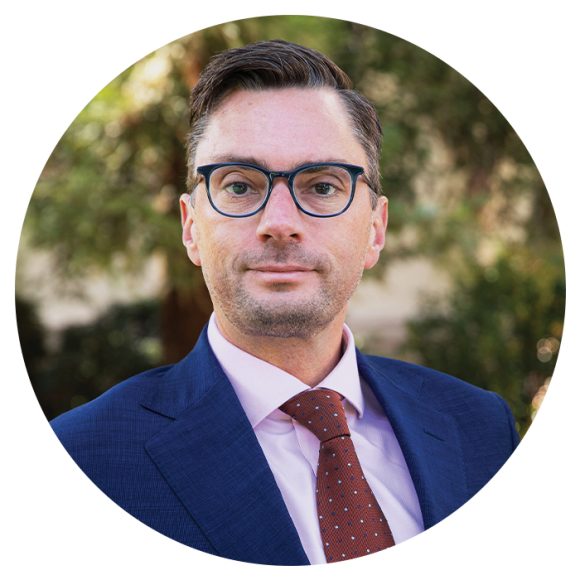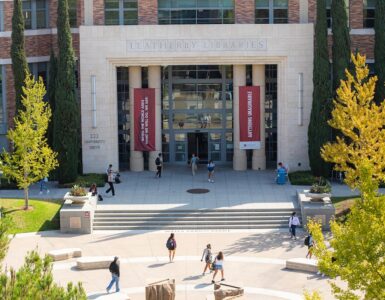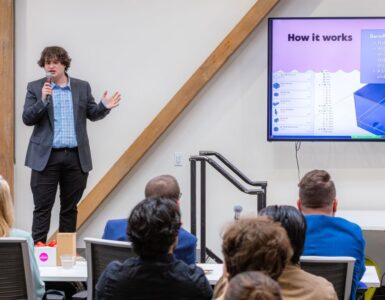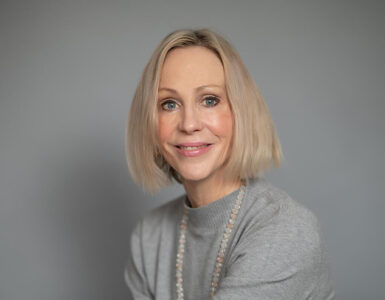 If Henrik Cronqvist’s thoughts were visible, they might look like a live stock index.
If Henrik Cronqvist’s thoughts were visible, they might look like a live stock index.
Cronqvist has been dean of Chapman University’s Argyros School of Business and Economics for less than a year, and he has already mobilized his vision for business education that meets industry and leadership demands of the next decade and beyond.
Where to start? Adding a “metaverse” executive to the faculty; more collaboration with Chapman’s No. 4-ranked film and media college; meeting the growing demand for data analytics; offering a STEM-specialized MBA; a brand-new Asia Pacific initiative.
And that’s just in 2023.
Or, as Cronqvist put it at Chapman’s 45th Economic Forecast in December, “No other business school has progressed as much as this business school in such a short period of time.
“That said, we have our best years ahead of us.”
From Sweden to American academia
Cronqvist’s own trajectory toward business higher education started in his native Sweden, where he grew up in a town of 2,500.
He had been interested in economics and finance – particularly the stock market – since high school.
He decided to study economics, earning his MS from the Stockholm School of Economics. His thesis advisor there introduced him to some of his former students who had gotten Ph.D.’s in the United States.
“Although I am a first-generation student, I was really intrigued by the prospect of a research career,” Cronqvist said.
In 1999, he began his doctoral work in finance at the University of Chicago. His doctoral advisor was Richard Thaler, who won the Nobel Prize in 2017 for his work in behavioral economics.
“Working with him and understanding how he thought about research projects and questions was a defining moment in my career,” said Cronqvist, who witnessed Thaler receive the Nobel in Cronqvist’s home country.
Behavioral economics became Cronqvist’s academic path. He now studies the behavior of investors and executives – one of his most recent published pieces is “The Social CEO.”
“CEOs, like humans more generally, are a product of their environment, beginning from birth and continuing with the various experiences throughout life,” Cronqvist writes with his co-author. “The compilation of these experiences determines not only the individual’s human and social aspects but also the policy direction of their firm.”
From local economies, to global partnership, to the metaverse
After Chicago, Cronqvist continued in American academia, teaching finance in the Midwest, China and Southern California. He landed in Florida and rose to vice dean at the University of Miami’s business school.
At Miami, he helped implement the school’s own stock index, an idea he is bringing to Chapman.
The two indices will track California and Orange County companies using Standard & Poor’s and will be copyrighted to Chapman. Cronqvist said he doesn’t know of another university in the state with a stock index.
“When I joined Chapman, many people told me, ‘Chapman is a hidden gem in Southern California.’ And I said to myself, ‘Why do we hide? What are we hiding from?’” he said.
“So we are going to move from being a hidden gem to just being a gem.”
As a global citizen, Cronqvist believes that Chapman “has gone from a local to a regional institution that is now making a sort of a leap into the national arena and also the global arena.”
As an educator and financial expert, Cronqvist gives concrete examples of his vision for how Chapman is making that leap – while holding to its history of economic research.
“We are starting out based on 45 years of economic forecasting with President Emeritus Jim Doti and others,” he said. “There has been a tradition here at the Argyros School of providing very helpful information for businesses that was focusing on local, regional, then national information.”
Part of Cronqvist’s vision includes the metaverse – a still-evolving concept of a central virtual world parallel to ours.
“I think the metaverse is an intriguing concept and that’s why we wanted to beef up everything we do around that,” he said.
He wants to appoint an esports and gaming executive as “metaverse executive in residence” who will offer industry panels, career advice and courses.
The metaverse – which encompasses anything in cyberspace and how humans interact with it – is a multibillion-dollar industry with a range of jobs. Cronqvist said one of Chapman’s career experts was recently “inundated” with inquiries about working in gaming and esports.
“There’s a lot of interest among young people for those products, and we’re in an area of the country where this is a very important industry,” he said. “We need to be able to meet demand among our students.”
Meeting industry demand
Cronqvist emphasized how important experiential learning is to him – “that we learn not only in the classroom, but also through projects out with real companies, simulation exercises, through team-based education.”
This relates to corporate partnerships. Cronqvist wants students to work at businesses that will give them the tools they need for the workforce.
“We already have good ties with industries, so we’re broadening and deepening those ties,” he said.
Orange County’s rich business landscape – which includes biotech, health care, finance and entertainment – is ideal for deepening those ties. Many locally based corporations like Disney, Pimco, Chipotle and Edwards Lifesciences already hire Chapman students, looking to innovate to solve challenges and impact the future.
“A lot of these companies are looking to digitally transform themselves and data has a very important role in that domain,” Cronqvist said.
Chipotle is an example, he said. During the pandemic, the company went from doing very little business online to “billions,” adapting to collect more information on customers.
To meet this exploding demand for data, Argyros is exploring offering a new master’s degree in business analytics. It will be “related to topics around data science, data analytics – machine learning, artificial intelligence, visualization of data,” Cronqvist said.
He is working on partnering with Chapman’s Schmid College of Science and Technology and Fowler School of Engineering for related courses, and for another new Argyros offering: a STEM-certified MBA.
“If you look at the job market, the kind of jobs that are out there that are well paying, many of them are quantitative analytics, making sense of data,” he said.
Hollywood and beyond
A related collaboration Cronqvist is working on is a new business of entertainment minor, through which he envisions capitalizing even more on Chapman’s proximity to Hollywood.
“Chapman is known for its No. 4-ranked Dodge College of Film and Media Arts, and that’s all some people may know about Chapman, right?” he said. “So this is a concrete example of how we integrate two schools.
“There are many different roles that are involved in Hollywood – it’s not only the directors or the producers,” he said, adding that the industry needs people in areas like finance and other positions on the business side of entertainment.
Chapman already offers a joint MFA/MBA program. In November 2022, Cronqvist and Dodge Dean Stephen Galloway interviewed DreamWorks co-founder Jeffrey Katzenberg.
Cronqvist is also looking beyond Tinseltown toward another facet of global business – Asia-Pacific commerce.
“The idea is that we will be a provider of thought leadership research that will be helpful to businesses, in terms of understanding what’s going on in Taiwan, what’s going on in mainland China, what’s going on in Vietnam,” he said. “How will what’s going on there impact businesses – we want to take leadership in this particular domain.”
He said the new Asia-Pacific Geoeconomics and Business Initiative will differ from those at other universities by focusing on the effects of countries’ business policies, rather than the region’s politics or culture.
“There’s many aspects of the Asia-Pacific region that business leaders would want to understand what’s going on, and we will fill that gap,” he said.
More about the impact of Argyros School of Business and Economics
Doti Foresees Recession in 45th Economic Forecast | Chapman Newsroom
Scholars Represent Chapman at Prestigious Economics Conference | Chapman Newsroom
Chapman Hosts ‘Shark Tank’-Style Panther Cage Match | Chapman Newsroom
Argyros Dean Publishes Article on ‘Social CEO’ | Chapman Newsroom





